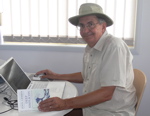Friday October 26, 2007 6:10 am Lennox Head, NSW Australia
A. Morning Musings
6:10 am
We had a little rain overnight and some more is forecast for today. The entire country could use all the rain it can get.
| Immediate |
Description |
Time |
| Science |
Complete reading "The Revenge of Gaia" |
2 hr |
| Literature |
The Nelson Introduction to Literature (essays) |
1 hr |
C. Actual Learning Activities
7:10 am
Science 7
October 26, 2007
8:20 am
This is a continuation of my notes on "The Revenge of Gaia". I have finished reading the book and am still spinning with the reasonableness of what Lovelock is saying. It may well be "an inconvenient truth", but it is better to face it than pretend it doesn't exist.
Chapter 6 Chemicals, Food and Raw Materials
- "Because our lives are so wholly urban, democracy ensures the election of governments almost entirely out of touch with the natural world." [p. 135]
- we over-reacted to the harm that DDT caused. Used in small amounts it would have been very valuable in many third world countries to control diseases such as malaria.
- "... the lack of support and sympathy for the rural poor makes them an unclassified minority in our multicultural society." [p. 140]
- "As I have said before, we cannot farm more than about half the Earth's land surface without impairing Gaia's capacity to keep a comfortable planet. Sadly, at our present numbers the lower productivity or organic farms compared with intensive agriculture makes it a dubious enterprise." [p. 155]
- "Despite all these warnings, we carry on destroying and seem to worry only about the nearly trivial, even imaginary, risk of cancer fro mobile telephones, power lines, pesicide residues in food, or sunlight; topping them all is a fear of anything to do with nuclear energy. ... Perhaps we know in our hearts the true nature of our peril and would rather face these imaginary risks than confront the ineluctable consequences of destruction." [p. 156 - 157]
- "Few of us are aware that the oxygen of the air is the dominant carcinogen of our envirionment." [p. 160]
Chapter 7 Technology for a Sustainable Retreat
- Ideas for stopping climate change by direct intervention at a planetary level:
- reduce the amount of heat received by the Earth from the sun
- sunlight-deflecting disc placed at the Lagrange point between the earth and the sun
- artificial production of marine stratus clouds across a large area of ocean surface
- adding sulfur-containing compounds to the air
- remove carbon dioxide and other greenhouse gases from the air
- there is still the problem of how/where to store it.
- "I repeat the phrase 'Combustion, Cattle and Chainsaws are the three deadly Cs' - use them as little as possible." [p. 168]
- The synthetic production of food seems to be a viable alternative to natural growing of food.
- Ultra-high-tech societies that use cell phones/computers may reduce the need for travel.
Chapter 8 A Personal View of Environmentalism
Chapter 9 Beyond the Terminus
- The idea of a blend of spirituality and science seems to provide the most promise.
Lovelock fails to address the fundamental nature of greed. It is greed that drives most criminal elements to do what they do (i.e. harm others) in order to gain money to buy a life style that they aspire to but which would otherwise be unattainable. It is greed that drives the stock market and the large corporations to make more and more profits. It is greed/envy that causes the have-nots to wish they were among the haves instead of realizing that they may in fact have the better life-style. We need to develop a desire for less, and to look with scorn and pity on those that have too much.
Here are a few books that Lovelock mentions that caught my attention:
- Mary Midgley (2002) Science and Poetry.
- Mary Midgley (2005) The Essential Mary Midgley.
- Kendall McGuffie & Ann Henderson-Sellers (2005) A Climate Modelling Primer.
- Jonathon Porritt (2000) Playing Safe: Science and the Environment.
- Dick Taverne (2005) The March of Unreason.
11:00 am
I have completed reading the Essays section of The Nelson Introduction to Literature. Here is a list of the remaining essays that I thoroughly enjoyed:
- David Freedman (USA): The Aggressive Egg
- a description of the language of fertilization of the egg/sperm
- Neil Bissoondath (Canada) From "Marginalization" in Selling Illusions
- being an immigrant in Canada
- Drew Hayden Taylor (Canada) Pretty Like a White Boy: The Adventures of a Blue Eyed Ojibway
- Naomi Klein (Canada) Threats and Temps: From Working for Nothing to "Free Agent Nation"
- recent trends in employment in Canada and the US.
These essays have really made me think! Now to find other sources of such essays.
